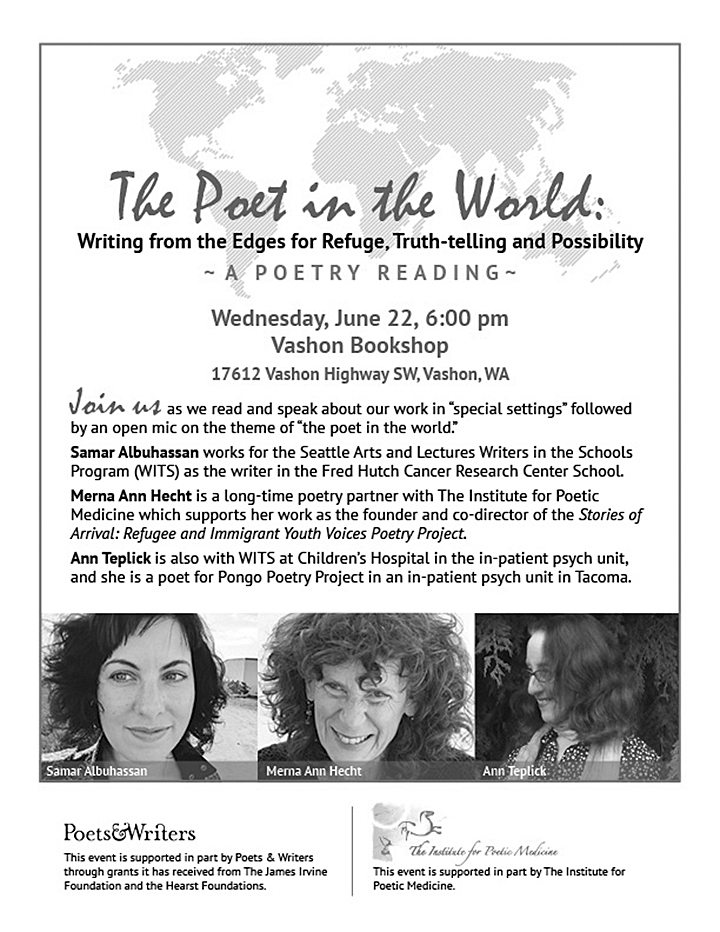What is the work of a poet in the world today? Islander Merna Hecht and Seattle poets Samar Albulhassan and Ann Teplick, will share the work they do — and the poems they write — at a reading to address the youth populations whose voices too often remain silent at 6 p.m. Wednesday, June 22, at Vashon Bookshop. A community open mic will follow the reading for island poets to read their own work related to the theme of “The Poet in the World.”
Many islanders are familiar with Hecht’s important work as founder and co-director of the Stories of Arrival: Refugee and Immigrant Youth Voices Poetry Project in Seattle. The poet and storyteller is also a longtime partner with The Institute for Poetic Medicine whose founder, the poet John Fox, proposed the reading to Hecht, who invited Albulhassan and Teplick to join her because of the work they all do with marginalized youth.
“We know each other’s work as teaching artists in specialized settings who bring young voices to the larger community that otherwise would not be heard,” Hecht said. “Samar’s work at the Fred Hutchinson Cancer Research Center School, Ann’s work with young people in psychiatric facilities and my work with young refugees are in different venues, but similar in intention.”
The event, she said, is also intended to be a community poetry reading. She hopes poets of all ages will bring work they feel speaks to their connection to poetry and the larger world; poems that fit with the theme “The Poet in the World.”
For Hecht, the poet’s work is to “insist on naming what is achingly transient and sacred about our brief time on the planet to bring us closer to becoming more wakeful, attentive and compassionate that we might inhabit our lives and our world more fully and humanely.”
Albulhassan described the task as writing “with the voice (the poet) is born with. Not voice as singular but as poly-vocal, honest, messy, contradictory, vivid. It’s not so easy to arrive at this voice, so the work is to uncover and excavate.”
For Teplick, the poet’s job is “to immerse oneself in all that is ferocious and complex.”
Both The Institute for Poetic Medicine and Poets & Writers, Inc., are supporting the reading, as each organization understands the vital role of poetry in our world. The institute offers “tools and support to heal body, mind and spirit through the creative and therapeutic process of hearing, speaking and writing poetry.” Poets & Writers is the nation’s largest nonprofit literary organization rooted in the belief that literature is vital to sustaining a vibrant culture.
That belief is echoed in the answers by the three poets to the question: “What can poetry communicate that other forms cannot?”
Hecht describes poetry as an art form that “can call on image and metaphor to wrap language around what seems unspeakable. Both inexpressible sorrow and sweeping joy that seem beyond words can often find a home in or between the lines of a poem.”
Teplick understands poetry as “the art of being succinct, thus urgent.”
Albulhassan said poetry “makes room for the ineffable stillness, fragments and murmurs. It is a visceral experience. The language of commerce, of politics … can feel flat and dull. Poetry draws a circle of light around a single syllable.”


